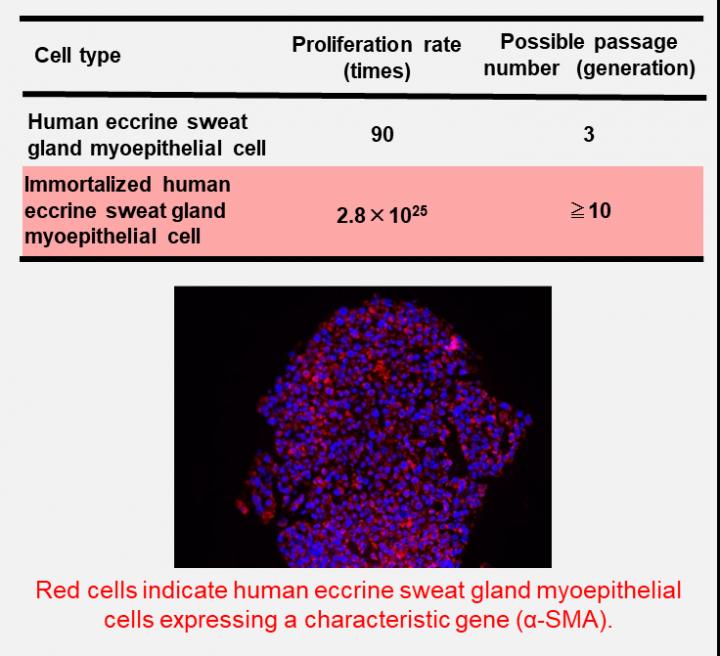Researchers generate immortalized human eccrine sweat gland myoepithelial cells

Credit: Osaka University
Solving sweat-related concerns that occur in daily life, such as hyperhidrosis and sweat smell, can improve people’s quality of life. Now, researchers from Osaka University, in collaboration with Mandom Corporation, have succeeded in generating Immortalized human Eccrine sweat gland Myoepithelial cells (iEM cells). Their findings could help develop next-generation antiperspirants and promote research on sweat dysfunction and sweat gland regeneration.
To control sweating, the researchers had to understand the properties of the cells that make up sweat glands and regulate their function. Myoepithelial cells found in sweat glands are involved in the contraction of the glands and function as stem cells to maintain the homeostasis of the glands, playing an important role in human sweating (Fig.1).
Cultured cells are useful for elucidating the function of human eccrine sweat gland myoepithelial cells; however, up until now, no human eccrine sweat gland cell line has retained the characteristics of myoepithelial cells.
In 2016, the research team established a method enabling human eccrine sweat gland cells to maintain the characteristics of myoepithelial cells for a short time by culturing human eccrine sweat gland myoepithelial cells under conditions similar to those in vivo.
“We focused on the fact that human eccrine sweat gland myoepithelial cells cultured in an environment similar to that in vivo form a spherical structure covered with myoepithelial cells. Direct introduction of an immortalizing gene into the spherical structure enabled us to efficiently immortalize human eccrine sweat gland myoepithelial cells, achieving a breakthrough in generating iEM cells,” says Fumihiro Okada, who led the study.
Human eccrine sweat gland myoepithelial cells could previously be subcultured for only around three generations. iEM cells, on the other hand, can be subcultured for more than ten generations. Moreover, iEM cells express α-smooth muscle actin (α-SMA), a gene that supports the function of human myoepithelial cells, retaining their properties (Fig.2).
Now, the material transfer agreement for iEM cells allows the cells to be transferred through Applied Biological Material Inc. to research institutes in many countries worldwide. “We expect that iEM cells, as a new test system for sweat glands, will aid in the development of antiperspirants, treatment of sweat gland disorders, and regeneration of sweat gland tissue.”
Product HP: https:/
###
About Osaka University
Osaka University was founded in 1931 as one of the seven imperial universities of Japan and now has expanded to one of Japan’s leading comprehensive universities. The University has now embarked on open research revolution from a position as Japan’s most innovative university and among the most innovative institutions in the world according to Reuters 2015 Top 100 Innovative Universities and the Nature Index Innovation 2017. The university’s ability to innovate from the stage of fundamental research through the creation of useful technology with economic impact stems from its broad disciplinary spectrum.
Website: https:/
About Mandom Corp.
Mandom Corp. (headquartered in Osaka Japan) is a cosmetics manufacturer. The company operates in Japan and Southeast Asia and is one of the leaders in the men’s cosmetics market.
Media Contact
Fumihiro Okada
[email protected]




